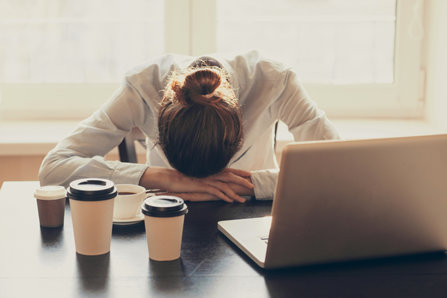Want to Sleep Better? Avoid Alcohol

Are you one of the tens of millions of people who fail to get enough sleep? Or who gets to sleep but then doesn’t feel well-rested in the morning?
If you’re pursuing a better night’s sleep, one of the factors you might want to check out is the effect of alcohol on that elusive good night’s sleep.
But Doesn’t Alcohol Help People Go to Sleep?
In a way, yes. At a certain point in alcohol intoxication, people may feel sleepy and may doze off. But that’s hardly an effective way to achieve a well-rested state. In fact, research has found that taking a few drinks before bedtime as a sleep aid might work for a few days. But then alcohol loses its effectiveness. After that, alcohol is much more likely to disrupt and disturb sleep, damaging the quality of one’s life.
Let’s look at why alcohol consumption interferes with a restful, healing night’s sleep.
How Does Alcohol Affect Sleep?
To understand this, it’s important to understand what REM sleep is.
“REM” refers to rapid eye movement, a phenomenon during a lighter stage of sleep. It’s when you’re likely to be dreaming and have a faster heart rate and respiration and more brain activity.
Achieving a sufficient quantity of REM sleep is believed to benefit memory, ability to learn and mood.
Disruption of REM sleep is associated with bad dreams and nighttime migraines. It can also impair physical and emotional health Functions as well as the ability to deal with stressful situations.
So how are alcohol consumption and REM sleep-related?
Laboratory tests show that alcohol consumption worsens both insomnia and breathing disturbances during sleep. These disturbances can interfere with a person’s retention of learned tasks if the alcohol is consumed right before bedtime.
One study concluded that this loss of learning resulted from a disruption of REM sleep. In fact, the more a person drinks before bedtime, the more they are likely to disrupt their REM sleep.
Low levels of alcohol consumption before bedtime were not associated with a disruption of REM sleep.
One research project that reviewed multiple studies on alcohol and sleep concluded that alcohol use delayed the initiation of REM sleep from its usual and normal pattern. The total time spent in REM sleep was also reduced.
Self-Medicating with Alcohol

The Sleep Foundation notes that people who drink in the evening may experience higher levels of insomnia and feel tired and sleepy the next day. These effects can drive a person into a vicious cycle of self-medicating with alcohol to fall asleep, consuming stimulants like caffeine during the day to wake themselves up, and then resorting to more alcohol use the next evening to get themselves to sleep again.
Binge Drinking
Not surprisingly, quickly drinking large quantities of alcohol causes a significant deterioration of sleep quality. Binge drinking describes the consumption of five or more drinks in a short period of a couple of hours (or four drinks for a woman).
Binge drinking severely affected the sleep of young adults, with both higher quantity and frequency of drinking being more damaging factors. Another study from Korea, found that adult men who scored higher on tests for alcohol disorders also had higher scores for sleep disturbances and poor sleep quality.
Alcohol and Sleep Apnea
Sleep apnea occurs when a person’s breathing during sleep is obstructed or impeded. A person with sleep apnea may snore loudly, partially wake up with a gasp dozens of times a night, and suffer poor quality sleep all night long. Alcohol consumption contributes to sleep apnea because this drug causes the throat muscles to relax abnormally. That relaxation can obstruct the airways in the throat, forcing a person to struggle to get enough air as they sleep.
Alcohol Consumption by Older Adults
One research project focused on the alcohol use of older men to determine how their consumption affected their sleep. Those who drank more than 21 standard units of alcohol each week woke several times a night. Those men who maintained this pattern over a few decades not only woke up frequently at night but were also tired when they woke up in the morning.
Alcohol and the Central Nervous System
Alcohol is both a stimulant and a sedative. If you drink a little, you may feel more excitable. But if you drink more, you’ll probably notice alcohol’s sedative effects.
“Alcohol can affect several parts of the brain, but, in general, contracts brain tissues, destroys brain cells, as well as depresses the central nervous system.”

In greater quantities and for those who suffer from alcoholism, alcohol can have a profound effect on the central nervous system (CNS). According to one research project, “Alcohol can affect several parts of the brain, but, in general, contracts brain tissues, destroys brain cells, as well as depresses the central nervous system.”
The harm done to the CNS can trigger sleep disorders. A properly functioning CNS is essential for normal, healing sleep. This relationship could explain why between 36% and 72% of those suffering from alcoholism also suffer from insomnia. It’s not uncommon for this insomnia to last for weeks or even months after a person stops drinking.
The Solution to Alcohol-Related Sleep Problems
There is a pretty overwhelming supply of scientific studies that support the conclusion that alcohol use damages the quality of a person’s sleep.
So what to do to improve sleep? The only real solution is a healthier lifestyle. And that means low levels of alcohol use and, in particular, avoiding consumption in the evening before bedtime.
Of course, evenings are when most people are available for drinking, for example, when they get off work or go out with friends. Therefore, achieving a healthier lifestyle with better quality sleep means that those who spend their evenings drinking have some choices to make. By realizing that a good night’s sleep is essential to health, the ability to learn and the improvement of one’s mood, it might not be as hard to make the choice to keep one’s drinking at low levels or even absent altogether.
Sources:
- https://www.medicalnewstoday.com/articles/247927#non-rem-sleep
- https://pubmed.ncbi.nlm.nih.gov/15282995/
- https://www.medicalnewstoday.com/articles/247927#alcohol-and-rem-sleep
- https://www.ncbi.nlm.nih.gov/pmc/articles/PMC2775419/
- https://www.ncbi.nlm.nih.gov/pmc/articles/PMC4998727/
- https://pubmed.ncbi.nlm.nih.gov/1576571/
- https://www.ncbi.nlm.nih.gov/pmc/articles/PMC6688758/
- https://www.sleepfoundation.org/nutrition/alcohol-and-sleep
- https://www.ncbi.nlm.nih.gov/pmc/articles/PMC3748176/
- https://www.ncbi.nlm.nih.gov/pmc/articles/PMC4666864/
- https://www.ncbi.nlm.nih.gov/pmc/articles/PMC5840512/
- https://www.nature.com/articles/s41598-020-62227-0
- https://pubmed.ncbi.nlm.nih.gov/21560041/
- https://pubmed.ncbi.nlm.nih.gov/23713737/
- https://www.hopkinsmedicine.org/health/conditions-and-diseases/primary-sleep-disorders-dyssomnias
- https://www.sciencedirect.com/science/article/abs/pii/S1087079203900050
Reviewed by Claire Pinelli, ICAADC, CCS, MCAP, LADC, RAS, LCDC


 ®
®